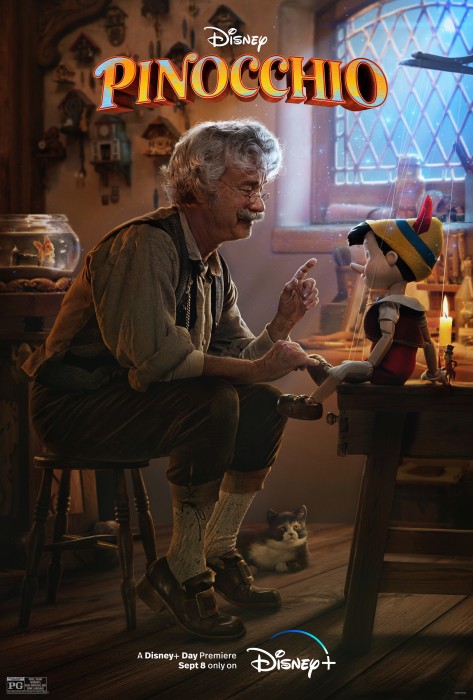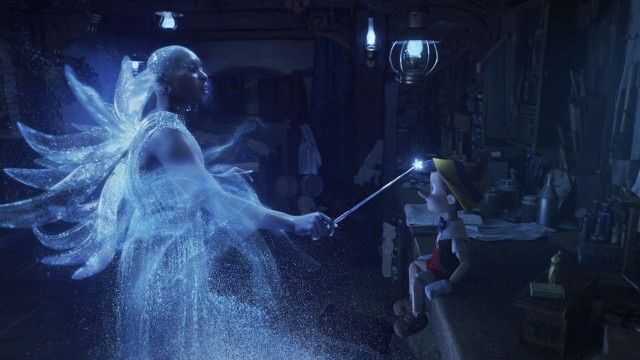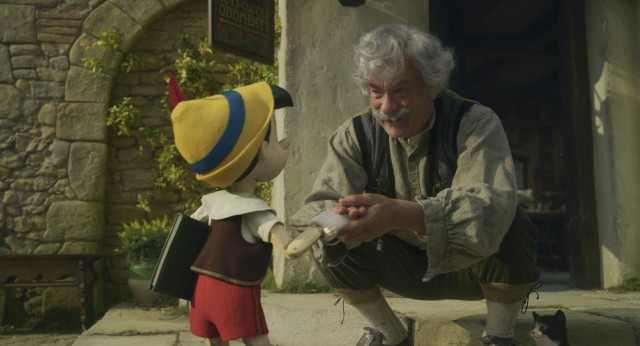Pinocchio (2022) Movie Review

Disney is running out of animated classics to remake. This practice has been by far the most lucrative source of dependable revenue among the studio's in-house live-action productions over the past decade.
At a time when Disney's adult movie divisions (Touchstone, Hollywood Pictures, etc.) have disappeared and their new entertainment is increasingly coming from the big brands they have acquired (Marvel, Lucasfilm, Fox), Disney has found a way to make a lot of money off the goodwill the public continues to hold towards the company's enduring animated triumphs.
Remakes of the 1990s Renaissance blockbusters have been the easiest paydays; 2017's Beauty and the Beast and 2019's Aladdin and The Lion King each grossed between one and two billion dollars worldwide. None of those musical productions was widely praised by critics for their creative approaches, but clearly that wasn't needed. The songs, the characters, and the stories of the hit original '90s cartoons required few updates to still resonate with moviegoers. A touch more cultural sensitivity and a bit more heroine depth in Aladdin. Photorealistic but still animated renderings of African wildlife in The Lion King. Disney may hire respected directors like Guy Ritchie and Jon Favreau, but these remakes practically make themselves while making Disney executives extremely wealthy.
Remakes of older animated classics are not as simple and straightforward. Maleficent reimagined Sleeping Beauty from the villain's perspective. Cruella did more or less the same thing for 101 Dalmatians, but with much more color and creativity. Dumbo let Tim Burton do his thing, which resulted in lower box office numbers and tepid reviews. And now here is Pinocchio, from director Robert Zemeckis.
The 82-year gap between the original 1940 film and this probably qualifies as a record in the history of cinema. This is the oldest movie Disney has remade and perhaps the most sacred. Out of Walt's earliest animated efforts, pioneer Snow White and the Seven Dwarfs and artful blend of music and animation Fantasia are often singled out for their historical significance. Pinocchio, released in between them, boasts the significance as well but also a more satisfying blend of the ingredients we associate with Disney magic: sharp songs, a gripping narrative with sympathetic heroes and compelling villains, fantastical elements, a prominent moral compass, and a comforting backdrop of course correction, wish fulfillment, and redemption.
In short, the original Pinocchio is everything we associate with and expect of Disney animation, which for many of us ends up being one of the longest relationships of our existence. It's not all that surprising that Pinocchio's Oscar-winning song "When You Wish Upon a Star" became something of Disney's signature anthem, providing the musical notes that accompanied the iconic blue castle logo that preceded the aforementioned '90s hits and continuing to do so over the overlong three-dimensionally animated castle with which modern Disney fare opens.
There is something about Disney's original Pinocchio that draws filmmakers to it. Steven Spielberg's A.I.: Artificial Intelligence (2001) is a long love letter to it, nearly to the point that it could be categorized as a futuristic remake. Others have been less artful and more literal in their adaptation of Carlo Collodi's original 19th century novel. Almost all of them, from 1996's The Adventures of...Pinocchio starring Jonathan Taylor Thomas to 2002's Pinocchio directed by and starring Roberto Benigni to 1965's animated Pinocchio in Outer Space, have paled in comparison. This doesn't inspire too much hope in Guillermo del Toro's dark stop-motion take hitting Netflix in December. Or in this Disney+ original, for that matter.

Zemeckis' film, which he co-wrote with Chris Weitz (About a Boy, 2015's Cinderella), does not stray all that far from Disney's original movie. It holds onto not only the iconic moments (the nose that grows with lies, the bumbling marionette show) but also the darker ones you'd be forgiven for forgetting if you haven't revisited it lately (Pleasure Island, anyone?). One thing dropped is smoking, which Disney has excluded from new films for over a decade now.
Italians haven't been all that vocally bothered about the depictions in the original Disney movie, so cultural sensitivity -- a fatal priority on Niki Caro's charmless live-action 2020 Mulan -- is not on the agenda here. Inclusivity is a different story. Although in theory set in 1800s Europe, like most new Disney works, Zemeckis' film seizes opportunities to provide representation to historically underrepresented demographics. The Blue Fairy had blue hair in Collodi's text and blonde hair in the 1940 movie. Here, she has no hair, as played by Cynthia Erivo, the black British actress who stood out in Bad Times at the El Royale (2018) and received two Academy Award nominations for 2019's Harriet. It's not completely unreasonable to ponder if Disney's hair and makeup department have joined the casting department in baiting the world to post racist and insensitive comments online when new images or trailers are dropped.
Erivo hits the notes needed to perform "When You Wish Upon a Star", which gets some modest and inoffensive additions. Although she now gets to perform the movie's standout song, her Blue Fairy is brief, not even resurfacing to help Pinocchio as she does in the 1940 one.
Mostly, the puppet turned nearly real boy (voiced by Benjamin Evan Ainsworth) relies upon his designated conscience, Jiminy Cricket (voiced by Joseph Gordon-Levitt, trying to do right by Cliff Edwards) to help him choose right over wrong. Of course, there are lots of opportunities to go wrong. Pinocchio is led astray by anthropomorphic foxstreet urchin "Honest" John (voiced by Keegan-Michael Key), the monstrous self-promoting puppeteer Stromboli (Italy's Giuseppe Battiston), and a wicked Coachman (a spirited Luke Evans, adding another Disney villain to his rap sheet).
The visuals are tasteful, something we usually can expect from Zemeckis, although his early 2000s motion capture years are now a Chip 'n Dale: Rescue Rangers punchline. The title character looks like a faithful 3D CGI rendering of the cartoon and digital elements blend together seamlessly in sunny stone streets and in the nighttime cacophony of Pleasure Island.
In a move that may make purists bristle, the original movie's lack of female characters has been addressed and corrected. This Pinocchio introduces Sofia (voiced by Lorraine Bracco), a seagull who gives Jiminy someone to talk to and a faster way of getting around. Sabine, the sort-of-living female marionette with whom Pinocchio shares the stage, comes with human operator Fabiana (Kyanne Lamaya), who has an injured foot (another square on your Representation Bingo card, kids).

It feels odd to have gotten this far into the review without acknowledging the fact that arguably the most accomplished of all modern film actors, Tom Hanks, plays Geppetto. In his mid-60s, Hanks seems to be embracing old man status, tackling the roles of this, Elvis' manager Colonel Tom Parker, and the curmudgeonly widower of A Man Called Otto (the US remake of A Man Called Ove) all in one year.
I wish I could say Hanks does something interesting in the most substantial live-action role of the film. But he largely just reminds us that America's Dad is now America's Granddad and still as inherently lovable as ever. Between The Polar Express and this, Hanks and Zemeckis have now collaborated on as many mixed-medium family films as PG-13 ones, but they're understandably unable to replicate the success of Forrest Gump and Cast Away under these conditions.
These conditions require that the filmmakers accept along with built-in recognition and broad commercial appeal a glass ceiling that hangs over their artistic achievements. No one who loves cinema will endlessly sing praises of a faithful new take on an old classic. I've enjoyed a few of Disney's efforts in this class, including The Lion King and Beauty and the Beast. But it's far easier to celebrate a remake that takes chances, like Cruella, than one that just goes through all the established beats without enraging you.
2022's Pinocchio does not improve upon the perfection of the original movie, nor does it even really try to. Zemeckis' remake is about all bringing the original film to a new audience and with new techniques. In that regard, it is unobjectionable. For a filmmaker as accomplished as Zemeckis to settle for his latest work, by no means a frugal production, forgoing theaters altogether and existing as a Disney+ Day selling point is unfortunate. But these are the business realities of cinema in 2022, a year that finds Disney in command of a staggering market share of the entertainment industry and using its power to first and foremost get streaming subscriptions.
Related Reviews:
DVDizzy.com | Movie Reviews | Search This Site
DVDizzy.com Top Stories:
Disney Remakes:
Cinderella (2015) • The Jungle Book (2016) • Beauty and the Beast (2017) • The Lion King (2019) • Aladdin (2019)
Maleficent • Dumbo • 101 Dalmatians (1996)
Directed by Robert Zemeckis: A Christmas Carol • Forrest Gump • The Walk • Flight • Beowulf
Text copyright 2022 DVDizzy.com. Images copyright 2022 Disney.
Unauthorized reproduction prohibited.